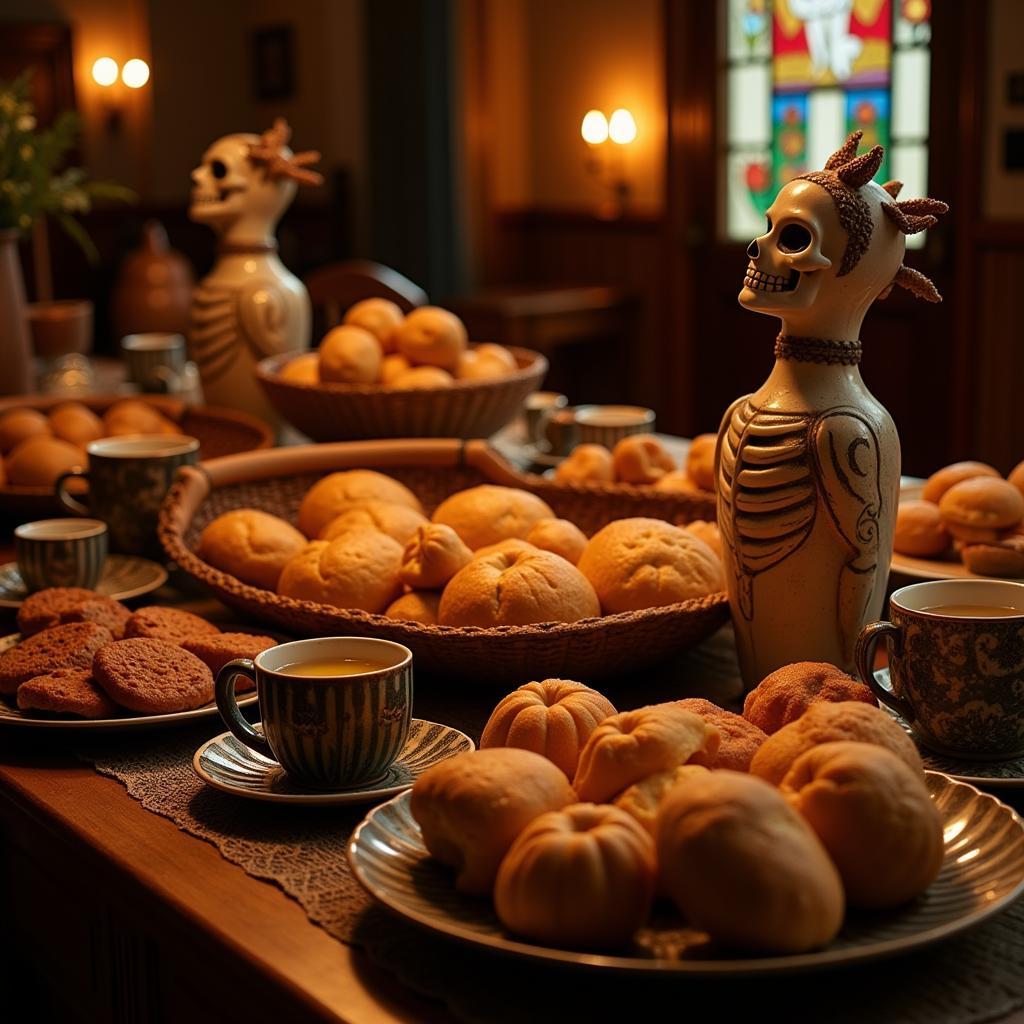All Souls Day Food traditions offer a unique lens into how cultures remember and honor the departed. This exploration delves into the rich tapestry of culinary customs surrounding this poignant occasion, examining the symbolic meanings behind the dishes and the comfort they bring to those left behind.
 Traditional All Souls Day Food Spread
Traditional All Souls Day Food Spread
From the sweet aroma of Pan de Muerto in Mexico to the simple elegance of Soul Cakes in Europe, All Souls Day food offers a tangible connection to the past. These dishes, often passed down through generations, serve as a culinary tribute to loved ones who have passed away. They are not merely sustenance, but rather vessels of memory, imbued with stories and traditions that transcend time. What are the traditional foods of this celebration, and what do they signify?
A Taste of Tradition: Exploring All Souls Day Food Around the World
Many cultures share the tradition of preparing special foods for All Souls Day. While the specific dishes vary, the underlying theme of remembrance remains constant. In some cultures, these foods are placed on altars as offerings to the deceased, while in others, they are shared among family and friends as a way of celebrating the lives of those who are no longer with us. Let’s journey through some of the most compelling culinary traditions:
- Pan de Muerto (Mexico): This sweet bread, adorned with bone-shaped decorations, is a staple of Dia de los Muertos (Day of the Dead) celebrations, which coincide with All Souls Day. Its unique flavor and symbolic representation of the cycle of life and death make it a powerful reminder of the ephemeral nature of existence.
- Soul Cakes (Europe): These small, round cakes are often spiced with nutmeg, cinnamon, and allspice, representing the sweetness of life and the warmth of memories. Traditionally given to children who sing songs for the souls of the departed, they symbolize the connection between the living and the dead.
- Mucbipollo (Yucatán Peninsula): This large tamale, filled with meat and wrapped in banana leaves, is a traditional Mayan dish prepared for Hanal Pixán, the Mayan celebration of the dead. Its elaborate preparation and communal consumption signify the importance of family and tradition in remembering the deceased.
- Ogi (Nigeria): In parts of Nigeria, Ogi, a fermented corn pudding, is prepared as an offering to the ancestors during All Souls Day. This act of remembrance acknowledges the role of past generations in shaping the present.
 Global All Souls Day Food Traditions
Global All Souls Day Food Traditions
Why We Share Food on All Souls Day
Sharing food is a universal act of communion. On All Souls Day, this act takes on a special significance, fostering a sense of connection with those who have passed. Food becomes a conduit for sharing memories, stories, and love. Sharing a meal provides comfort and solace during a time of grief.
We are what we eat a slow food manifesto reinforces the importance of food in our lives, both physically and emotionally. It’s a reminder that food is more than just sustenance; it’s a part of our cultural identity and a way of connecting with our heritage.
The Comfort of Familiar Flavors
The familiar flavors of traditional All Souls Day food evoke powerful memories of past celebrations and loved ones. These sensory experiences offer comfort and a sense of continuity, bridging the gap between the past and the present.
“Food is a powerful tool for healing and remembrance,” says Dr. Maria Sanchez, a cultural anthropologist specializing in food traditions. “The act of preparing and sharing traditional dishes can provide a sense of comfort and connection to loved ones who are no longer with us.”
Remembering Loved Ones Through Food
Heart food picks can also be adapted to create special meals that honor the memory of loved ones on All Souls Day. By incorporating their favorite dishes or ingredients, you can create a personalized tribute that celebrates their unique lives.
Blessed sacrament church – food distribution center and similar organizations often hold special events and meal services during All Souls Day, providing a space for community and remembrance. These events not only offer comfort and support to those grieving but also highlight the importance of sharing food as a way of honoring the departed.
All Souls Day Food: A Culinary Legacy
All Souls Day food is a testament to the enduring power of tradition and the importance of remembrance. These dishes, imbued with symbolic meaning and rich history, provide a tangible connection to the past, offering comfort and solace to those who mourn the loss of loved ones. By continuing these culinary traditions, we honor the memory of those who have come before us and celebrate the enduring power of food to connect us across generations.
In conclusion, All Souls Day food is more than just sustenance; it’s a symbol of remembrance, a source of comfort, and a celebration of life. As we partake in these culinary traditions, we honor the memory of those we have lost and strengthen our bonds with those who remain.
Je food is another resource that explores the connection between food and culture. This platform offers valuable insights into how food shapes our traditions and creates a sense of belonging.
Family and food quotes beautifully capture the essence of this bond. As we gather with loved ones to share a meal, we create lasting memories and strengthen the ties that bind us together.
FAQ
- What is the significance of All Souls Day food?
- What are some common All Souls Day food traditions?
- How can I incorporate my family’s traditions into All Souls Day?
- Are there any vegetarian or vegan options for All Souls Day food?
- Where can I find recipes for traditional All Souls Day dishes?
- How can I learn more about the history and cultural significance of All Souls Day food?
- What are some ways to honor deceased loved ones through food beyond All Souls Day?
For assistance, please contact us at Phone Number: 02437655121, Email: minacones@gmail.com or visit us at 3PGH+8R9, ĐT70A, thôn Trung, Bắc Từ Liêm, Hà Nội, Việt Nam. We have a 24/7 customer service team.